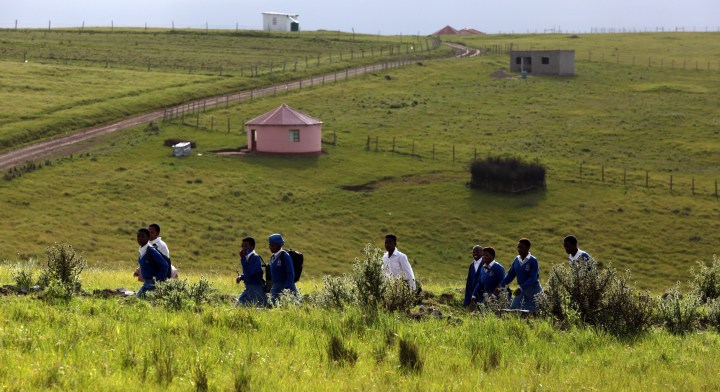THE CONVERSATION OP-ED
Leadership, resilience is behind the success of one rural school

It is possible for South African schools facing huge challenges to get noteworthy results.
Each weekday, hundreds of thousands of children and teenagers in South Africa’s rural areas (which make up just over 31% of the country’s total area) make the journey to school. It’s often difficult. Poor road networks and a lack of easy access to transport make just getting to and from school a challenge.
Many rural schools are dilapidated and poorly equipped. It’s very unusual for these schools to have libraries, computer rooms or science laboratories.
There has been some improvement in matric (school-leaving) exam results in the largely rural provinces. In 2016 the Eastern Cape, KwaZulu-Natal and Limpopo – provinces that are home to about 72% of rural South African children – were ranked last among all nine provinces.
The most recent results, for the matric class of 2023, show progress in these underperforming areas. KwaZulu-Natal, for instance, was ranked second out of the three rural provinces, with 86.3% of its matric candidates passing the final exam.
But despite some bright spots, there is a sense among experts and pundits that rural education needs to be entirely reimagined.
I am an education researcher with a particular interest in rural schooling. In a recent research paper I focused on a rural South African high school, interviewing the principal, a deputy principal, three heads of department (academic subjects) and one non-academic staff member.
Today the school consistently performs well in the annual matric exams. From 2020 to 2023, the percentage of the school’s matric pupils who passed the final exams was 66.7%, 92.1%, 81.3% and 88.6%, respectively. This is significantly higher than other schools in the same area.
The school is as poorly equipped as its nearby counterparts. It does not have good infrastructure. The pupils still have to travel, as others do, a long way on bad roads to get to school. Yet it is a star performer.
The secret to its success, my research found, is the resilience of its leadership team. Resilience in this instance relates to how the teachers and other staff are able to withstand the difficult challenges of a lack of infrastructure and the learners’ poor socioeconomic background to ensure academic success.
My findings suggest that rural school leaders must develop resilience in their pursuit of pupils’ success. They must also strive to avoid total reliance on the government for support. The government must, by law, fund and maintain the education sector. But the reality is that this support isn’t always forthcoming.
This means that rural school leaders must be proactive and – as the school in my study has done – consider other possible avenues to solve their problems.
The case study
The school I studied does not charge fees. Its 737 pupils come from various villages in the vicinity. (Though, as a result of the impressive matric pass rate, more people from other towns are also enrolling their children.)
Some years ago the principal, tired of constant delays in receiving government support, opted to explore alternative means of support. He began travelling to businesses in nearby towns to ask for assistance and found that the school’s remote location made it a tough sell. However, he persisted and was able to get some financial support from various businesses. This was used to buy textbooks and mathematical sets; some was set aside for maintaining or even restructuring school buildings.
The principal’s persistence and belief in the school’s ability to thrive was echoed by the teachers. He and the teachers began buying school uniforms and shoes with their own money to help pupils who couldn’t afford these basic essentials feel more comfortable and committed to their schooling. The staff also organised extra classes after school hours and on weekends to help pupils stay on top of the curriculum.
A few years ago the teachers also began travelling to and from the school together in one minibus taxi. The road is terrible, and even the few teachers who owned cars didn’t want to risk the drive.
The shared transport fostered harmony among the staff: they got to know each other, chatted about their lives and their pupils, and were able to ask their colleagues for advice in a relatively informal setting.
This shows that what ordinarily could be a form of disadvantage – a long, difficult commute to school – can be turned into an advantage.
All of this illustrates what is possible when school leaders and teachers explore all possible means of collaborating with one another to achieve success in their schools.
Building resilience
My findings echo those of a 2022 study that found that leadership is especially critical to rural schools’ success – even in wealthier countries with decent infrastructure.
And this latest study underscores a point that a colleague and I made in a 2019 research paper, namely that, with or without the desired infrastructure, having the right leadership in place can still ensure success for rural schools.
To do this, deserving rural school leaders must be recognised by the government and their peers, perhaps with awards for their good performance.
Platforms should be created where those rural school leaders who have turned their schools around for the better can share their successes, failures and lessons, as well as offer encouragement to others.
It is easy for rural teachers working in tough circumstances to focus on the immediate challenges and become disheartened. By focusing on the bigger picture – their learners’ future and potential to succeed – they will be able to build resilience and create the best possible learning environment. DM
First published by The Conversation.
Chinaza Uleanya is an associate professor at the University of Johannesburg.
This story first appeared in our weekly Daily Maverick 168 newspaper, which is available countrywide for R29.





















Comments - Please login in order to comment.